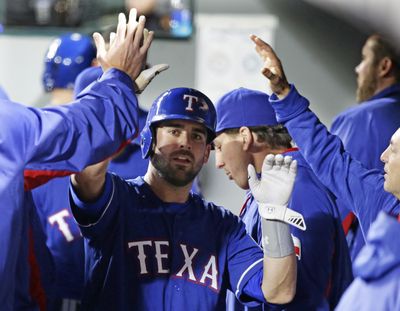Spokane Indians connection serves Texas Rangers well

A catcher by trade, he’s played 344 minor league games at first base as the Texas Rangers invested starts in younger catchers. He began this, his seventh professional season, in Triple A for a third straight year.
And on Monday night, he made his major league debut, banging out two hits, throwing out a would-be base stealer and babysitting veteran righthander Colby Lewis through a dominating effort over the Seattle Mariners.
Storybook stuff. Made even more so by 25 family members being the loudest sliver of a small Safeco Field crowd – including his 92-year-old grandfather Frank McCabe, a one-time amateur pitcher at Fort Lewis still living in Tacoma.
“He taught me the game,” Nicholas said. “To be able to show him the happiness that is this game and be here in front of him, it’s just a memory I’ll never forget. No. 1 in my book right now.”
A special moment, sure, but not all that improbable. Not with the Rangers, who seem to cultivate these sorts of opportunities.
When the 27-year-old Nicholas was called up to replace injured regular Robinson Chirinos, it pushed the number of Rangers farm system players on the 25-man active roster to 12. Notably, no fewer than nine of those launched their pro careers or made a stop in Spokane.
Ryan Rua had five hits in his first six at bats against the Mariners. Derek Holland, who made it into the Rangers’ rotation just two years after his 2007 season in Spokane, kept the hapless M’s of manager Scott Servais bottled up for another night on Tuesday. Second baseman Rougned Odor, expected to be the franchise’s next star, had three RBIs on Monday.
Pitchers Keone Kela, Phil Klein and Martin Perez, shortstop Hanser Alberto and first baseman Mitch Moreland all wore Spokane uniforms. Back in Triple-A Round Rock are six more former Indians with MLB time served.
This shouldn’t be all that big of a deal – it’s the function of farm systems to groom players for the big club.
Except for the Seattle farm system, apparently.
On the Mariners’ current roster are exactly four home-grown players: Felix Hernandez, Ketel Marte, Kyle Seager and Taijuan Walker. Key pieces all, but that’s not much of a number.
And it speaks to the struggles the franchise has endured since 2003.
Whatever the failings of each individual Mariners team, the organization’s inability to identify, draft and develop position players capable of becoming foundational pieces is crazy-making. And a couple waves of promising arms in the past decade haven’t panned out, either. This has put ever more pressure on management to create a contender out of trades and free agency, and the M’s haven’t been any better at hiring genius than they’ve been in player development.
Now, a look at those former Indians on the Rangers’ roster isn’t going to put the Hall of Fame on high alert. But the point is, Texas has managed to fill around its stars with productive system players and win the American League West three times in six years, with two other 90-win seasons.
Since hooking up with the Rangers in 2003, the Indians have sent 59 players to the major leagues. In the same span, Seattle’s Northwest League affiliate in Everett has moved 39 to the bigs.
“I joked around with all the blood, sweat and tears on my jersey just to get here, I’m lucky they gave me a new one or it wouldn’t match the team,” Nicholas said.
“These guys make sure they promote within because of the amount of work they put in on their side to get us where we are. It’s a pat on the back for the whole organization when one of ours gets up here.”
And the pats get spread around.
“It’s got to say a lot about our development department,” Rangers manager Jeff Banister said after Nicholas’ big night. “When these guys come up, they’re not overwhelmed by the moment.”
A few years ago, the Rangers’ director of player personnel pulled through Spokane to check up on that season’s prospects, and spoke to that very issue.
“You can talk all you want about your minor league talent,” he said, “but if they get to the big leagues and don’t do well right away, we lose credibility.
“People always say, ‘Hey, the big league club is going to do it this way and it’s going to filter down.’ I take the opposite approach: You start at the bottom and work up. If you ingrain in kids that we’re going to win – because you can get a bunt down or get a guy in from third or throw strikes – it will just grow as they take it up the ladder.”
Sounds like a plan. Who said it?
Fella named Scott Servais. Wonder if anyone in his new workplace is listening?